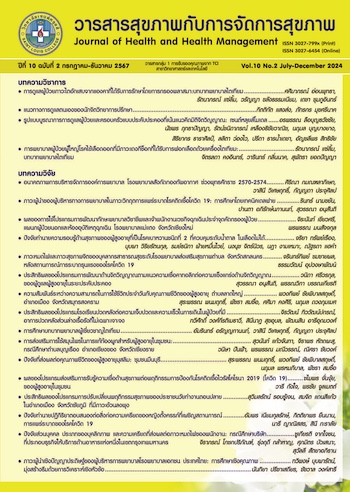Relationships Between Barthel ADL Index and Quality of Life of Elderly at LatYai Sub-District, Mueang District, Samut Songkhram Province
Keywords:
ADL, Quality of Life, ElderlyAbstract
The purposes of this descriptive research were to study the quality of life and examine the relationship between personal factors, Barthel ADL index and the Quality of life of Elderly at LatYai Sub-District, Mueang District, Samut Songkhram Province. The sample of 125 elderly with quota sampling. The research instruments included the personal factors record, Barthel ADL Index and WHOQOl BREF THAI questionnaires. The data were analyzed by using descriptive statistics for personal factors and ADL data. In addition, the data of quality of life were analyzed by using descriptive statistics, Chi-square test and Fisher exact test. The results of the study revealed that overall quality of life of the elderly was at the good level (69.60 %). The scores of the quality of life of physical, psychological, social relationship and environmental domains also were at the good level with the percent of 66.40, 70.40, 73.60 and 68.00 relatively. In addition, the personal factors including age, marital status, residence, have diseases and Barthel ADL index had a significant correlation with the quality of life of the elderly (p<.01). The results of the study can use data on the elderly. To improve and develop the quality of life of the elderly in accordance with the traditions, context, identity, and living conditions in the area.
References
กรมกิจการผู้สูงอายุ. (2566). สถานการณ์ผู้สูงอายุไทย พ.ศ. 2565. กรุงเทพฯ: บริษัท อัมรินทร์คอร์เปอเรชั่นส์ จำกัด.
บุญใจ ศรีสถิตนรากูร. (2550). ระเบียบวิธีวิจัยทางการพยาบาล. (พิมพ์ครั้งที่ 4). กรุงเทพฯ: โรงพิมพ์แห่งจุฬาลงกรณ์มหาวิทยาลัย.
มูลนิธิสถาบันวิจัยและพัฒนาผู้สูงอายุไทย. (2556). รายงานประจำปีสถานการณ์ผู้สูงอายุไทย พ.ศ. 2555. นนทบุรี: บริษัท เอสเอส พลัส มีเดีย จำกัด.
วาสนา หลวงพิทักษ์, จิตติมา ดวงแก้ว, อุมากร ใจยั่งยืน, และเพ็ญรุ่ง วรรณดี. (2562). ปัจจัยทำนายคุณภาพชีวิตของผู้สูงอายุในเขตจังหวัดสุพรรณบุรี. วารสารพยาบาลศาสตร์ มหาวิทยาลัยสยาม, 20(38), 67-81.
วิไลพร ขำวงษ์, จตุพร หนูสวัสดิ์, วรารัตน์ ประทานปัญญา, และจิดาภา ศิริปัญญา. (2554). ปัจจัยที่มีความสัมพันธ์กับคุณภาพชีวิตของผู้สูงอายุ. วารสารวิจัยทางวิทยาศาสตร์สุขภาพ, 5(2), 32-40.
วัชรากรณ์ ชีวโศภิษฐ. (2562). สังคมผู้สูงอายุ: ปัจจัยการตลาดที่เปลี่ยนไป. วารสารมหาจุฬานาครทรรศน์, 6(1), 38-54.
สถาบันเวชศาสตร์ผู้สูงอายุ กรมการแพทย์. (2558). แนวทางการดูแลรักษากลุ่มอาการสูงอายุ. นนทบุรี: บริษัท อิส ออกัส จำกัด.
สุวัฒน์ มหัตนิรันดรกุล, วิระวรรณ ตันติพิวัฒนสกุล, วนิดา พุ่มไพศาลชัย, กรองจิตต์ วงศ์สุวรรณ และ วราณี พรมานะรังกุล. (2545). เครื่องชี้วัดคุณภาพชีวิตขององค์การอนามัยโลก ชุดย่อฉบับภาษาไทย. โครงการจัดทำโปรแกรมสำเร็จรูปในการสำรวจสุขภาพจิตในพื้นที่ ปี พ.ศ. 2545.
สำนักงานสถิติแห่งชาติ (2562). รายงานสถิติจังหวัดสมุทรสงคราม 2562. สมุทรสงคราม: สำนักงานสถิติจังหวัดสมุทรสงคราม.
Barnett, K., Mercer, S. W., Norbury, M., Watt, G., Wyke, S., & Guthrie, B. (2012). Epidemiology of multimorbidity and implications for health care, research, and medical education: a cross-sectional study. The Lancet, 380(9836), 37-43.
Daely, S., Nuraini, T., Gayatri, D., & Pujasari, H. (2022). Impacts of age and marital status on the elderly’s quality of life in an elderly social institution. Journal of public health research, 11(2), doi: 10.4081/jphr.2021.2731
Doosti-Irani, A., Nedjat, S., Nedjat, S., Cheraghi, P., & Cheraghi, Z. (2018). Quality of life in Iranian elderly population using the SF-36 questionnaire: systematic review and meta-analysis. Eastern Mediterranean Health Journal, 24(11), 1088-1097. doi: 10.26719/2018.24.11.1088
Gondodiputro, S., Wiwaha, G., Lionthina, M., & Sunjaya, D. K. (2021). Reliability and validity of the Indonesian version of the World Health Organization quality of life-old (WHOQOL-OLD): a Rasch modeling. Medical Journal of Indonesia, 30(2), 143-151.
Henning-Smith, C. (2016). Quality of life and psychological distress among older adults: The role of living arrangements. Journal of applied gerontology, 35(1), 39-61.
Hongthong, D., Somrongthong, R., & Paul, W. A. R. D. (2015). Factors influencing the quality of life (Qol) among Thai older people in a rural area of Thailand. Iranian journal of public health, 44(4), 479-485.
Mahoney, F. I., & Barthel, D. (1965). Functional evaluation: The Barthel Index. Mary land State Medical Journal, 14, 56-61.
Samadarshi, S. C. A., Taechaboonsermsak, P., Tipayamongkholgul, M., & Yodmai, K. (2021). Quality of life and associated factors amongst older adults in a remote community, Nepal. Journal of Health Research, 36(1), 56-67.
Torres, P. A., Helmstetter, J. A., Kaye, A. M., & Kaye, A. D. (2015). Rhabdomyolysis: pathogenesis, diagnosis, and treatment. Ochsner Journal, 15(1), 58-69.
Wijesiri, H. S. M. S., Wasalathanthri, S., Weliange, S. D. S., & Wijeyaratne, C. N. (2023). Quality of life and its associated factors among home-dwelling older people residing in the District of Colombo, Sri Lanka: a community-based crosssectional study. BMJ open, 13(4), e068773. doi: 10.1136/bmjopen-2022-068773
World Health Organization. (1997). WHOQOL: Measuring quality of life. Retrieved from https://iris.who.int/handle/10665/63482
Downloads
Published
How to Cite
Issue
Section
License
Copyright (c) 2024 Journal of health and health management

This work is licensed under a Creative Commons Attribution-NonCommercial-NoDerivatives 4.0 International License.




